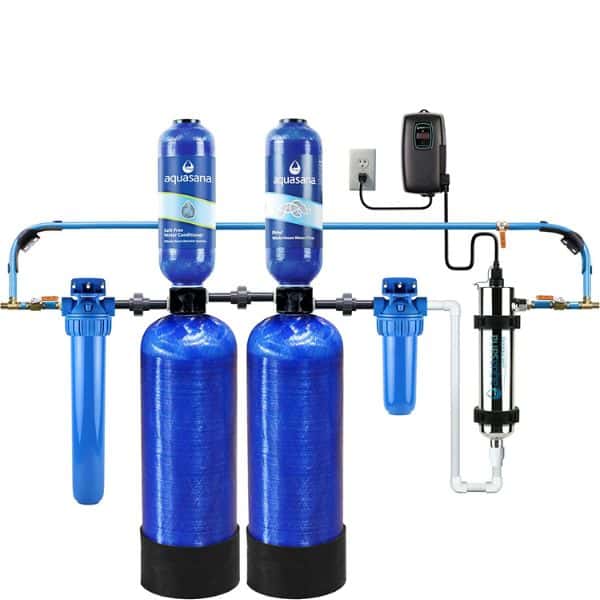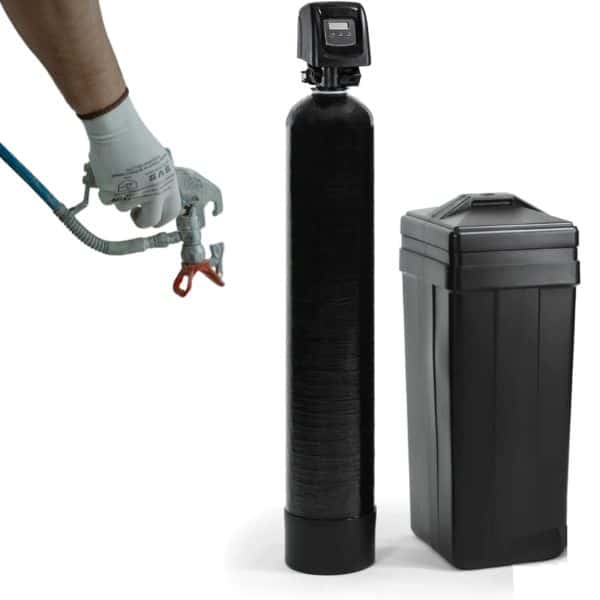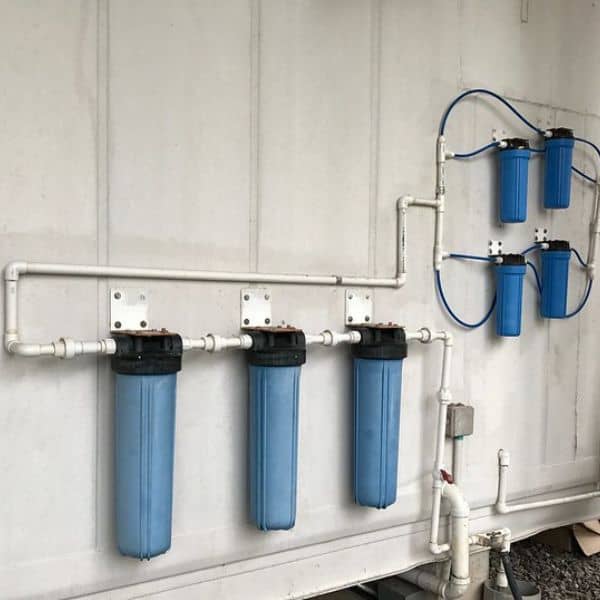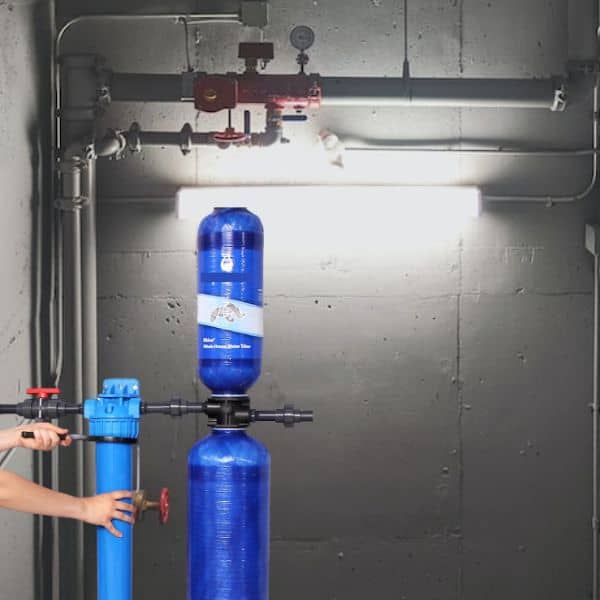What Is a Whole House Water Filter System?
A whole house water filter system is a great way to ensure the water in your home is clean and healthy. It works by taking the water supply from the main line, running it through a multi-stage filtration process, and then sending it throughout your home. The most common filtration processes used are carbon filtration, ion exchange, sediment filters, and reverse osmosis.
Additionally, some systems may also use ultraviolet light for added protection against bacteria. All of these filtration techniques combine to create high-quality drinking water that can be found anywhere in the home. A whole house water filter protects your health by removing toxins like lead, chlorine, and other impurities from your pressure tank supply.
As an extra bonus, installing a system like carbon filter or RO for whole house water filter will save you time and energy as the entire home is being filtered at once – meaning you don’t have to worry about having different types of filters or replacing them regularly like traditional tap-based filtration systems.

What Is a Whole House Water Softener?
Have you ever noticed that when you chug a glass of tap water, the feeling afterward is grainy and unpleasant? This is due to a phenomenon known as hard water. Hard water contains often unbearable levels of dissolved minerals like calcium and magnesium – but fear not!
A whole house water softening system will combat this problem. By removing the ions from your home’s pipes that cause hardness in your water pressure, your showering or washing experience will be transformed into one of luxury – soft liquid heaven!
Not only does softening your water make it more enjoyable, but it also results in long-term cost savings. To put it simply, appliances will last longer with less mineral buildup on your pipes.

Difference Between Water Filters & Water Softeners:
A common question that many people have is what is the difference between water filters and water softeners? To put it simply, water filters are designed to reduce the amount of contaminants such as chemicals, metals, and other sediments present in your drinking water. These can include pharmaceuticals, bacteria, viruses, heavy metals, and other particles.
Water softeners work by eliminating calcium, magnesium, and iron from hard water which helps reduce the effects of scaling on the pipes in your plumbing system. In some cases, both are needed to provide a comprehensive solution.
A sediment filter can effectively remove unpleasant tastes or odors while also providing healthy levels of drinking water. On the other hand, a water softener will help make all of your laundry and dishes cleaner with softer water since all minerals have been removed.
Both are essential for ensuring that you get safe and clean drinking water as well as protecting your plumbing system from corrosion caused by hard mineral build-up in the pipes. Ultimately, if you’re looking for total confidence when using tap water in your home then investing in both a filter and a softener would be the best course of action.
Why Do You Need a Whole House Water Filter & Water Softener?
Clean water is essential for good health, and having a whole house water filter and water softener are two of the best ways you can ensure that your home has access to safe, clean H2O. Whole house filters provide clean water to every faucet in your home by removing harmful contaminants like lead, arsenic, mercury, and other metals. In addition to protecting your family’s health, this can also benefit the life of all your appliances that use water, extending their lifespan and helping you save money on repairs or replacements.
Water softeners work by reducing the minerals that make up hard water, which not only helps keep your pipes from hardening over time but also makes soap and other cleaning products more effective. Plus, since soft water takes less energy to heat for showers or for doing laundry, it can help lower monthly electric bills too!
Do You Need Both?
When it comes to overall water quality, the answer is yes – you do need both a water softener and a filter. Filters can help remove heavy metals, bacteria, and other contaminants while water softener protects pipes by reducing scaling on them. Both are essential for providing your home with healthy drinking water as well as keeping your appliances running smoothly.

Whole House Water Filter Before Or After Water Softener?
When it comes to deciding between installing a whole house water filter first, or a water softener, there are many factors to consider. Do you live in an area with hard water? Does your tap have sediment buildup? These types of concerns can inform your decision on which solution to pursue first.
Generally speaking, most people will install their water softener before the filter, as it is designed to use mechanical processes that remove contaminants from the water supply while also removing calcium and magnesium ions that are responsible for making the water hard.
By doing so, the filter is then able to absorb other impurities like chlorine and chemicals without becoming clogged due to deposits already present in the system. Ultimately, your choice should be based on personal preference and how much you value easy maintenance combined with clean filtered drinking water.
One should consider the following factors to achieve maximum efficiency from the house water filter and water softener.
Water Source
It is essential to understand the source of the water that you are using, as well as any potential contaminants that need to be removed. Knowing this information will help determine which system should be installed first in order to get the most effective results.
Sediment Levels
Hard water can create sediment buildup in pipes, making a water softener necessary to help reduce the minerals. A whole house filter will then follow to help trap and remove other impurities that could be present in the water supply.

Iron Levels
If your home has high levels of iron, it is necessary to install a water softener first as this will help remove the minerals before they pass through the filter. This way, the filter won’t become clogged up and inefficient due to sediment buildup over time.
Chlorine Levels
Chlorine is a common chemical found in many city water supplies and can be hazardous to your health. Installing a filter after the softener will ensure that any chlorine present in the system is reduced as much as possible before it enters your home.
So, when it comes to deciding between installing a whole house water filter before or after a water softener, different factors like your home’s water source, sediment levels, and iron and chlorine content will determine the most effective solution for you. Ultimately, your choice should be based on personal preference and how much clean drinking water you value.
Final Verdict
The answer to whether you should install a whole house water filter before or after a water softener depends on multiple factors, including your home’s water source, sediment, and iron levels, as well as chlorine content. Generally speaking, most people will install their water softener first as it will help reduce the minerals in the system before the filter is installed.
Ultimately, your choice should be based on personal preference and how much you value clean filtered drinking water. By understanding the different elements of your water supply, you can make an educated decision on which system to install first in order to get the most effective results.
